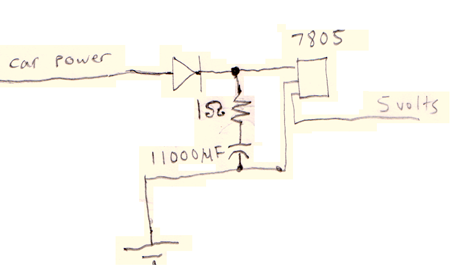|
|
|
pauseable cheap MP3
Monday, October 25 2010
Some months ago I'd bought a cheap $8 MP3 player for the Honda Civic, which Gretchen uses four days each week to drive down to the Eastern Correctional Facility in Napanoch (24 miles away). Given the long drive, Gretchen likes spending that time listening to podcasts. But after repeated use, a problem has emerged. The MP3 player is a simple device that plugs into the cigarette lighter and transmits its audio to the radio on FM 107.9. But because it has no battery of its own, it gets reset every time the car is started or turned off. The player is smart enough to remember what FM frequency it was broadcasting on and what MP3 it was playing, but it forgets where in the MP3 it was. This is not a problem with music, but it makes listening to an hour-long podcast difficult, particularly since there is no fast-forward or "rewind" function. Gretchen hears the first half hour of Terri Gross's Fresh Air, and then she has to turn her car off because she's at the prison. So when she drives home she ends up hearing the first half of a different podcast.
Since tooling around yesterday in the Honda Civic (somehow I managed to carry all that treated lumber in it) and becoming acquainted with these shortcomings firsthand, I've been wanting to remedy them. So last night I took the MP3 player apart and discovered that it ran on five volts using a tiny 7805 linear regulator attached to the car's 12 volts of power. Using a diode and a large (11,000 μF) capacitor, I managed to devise a circuit that would allow the MP3 player to stay alive for a few seconds through the sort of brownout that happens when one starts a car (a power dip that even happens to devices attached directly to the car battery). The diode was important to keep power stored in the large capacitor from being back-drained by the rest of the car, and it was also important to put the capacitor upstream from the voltage regulator (to make sure that the power being stored was the highest voltage possible). With larger capaciators (such as a 100,000 μF capacitor the size of a Fosters can), I found I tended to blow the fuses upstream from the capacitor unless I put a low-ohmage resistor (one ohm seemed sufficient) in series with the capacitor to slow its charge time.
Of course, none of this was going to work with the Honda Civic as it existed; its cigarette lighter only worked when the key was in the ignition. So today I added another cigarette lighter (as a cord coming out of one of the holes in the dashboard) connected directly to the battery. This setup allowed the MP3 player to be left on in the car indefinitely, that is, until the car's battery goes dead. But since MP3 players use relatively little power, the upshot is that Gretchen can listen to half a podcast, go into the prison for two or three hours, and when she gets back to the car the MP3 player will be ready for her to continue listening precisely where she'd paused it.
Two things worth mentioning:
- The large capacitors I used today were from a set I'd dumpsterdived at the University of Virginia maybe 15 or 16 years ago. They're high-value, but not as high as today's "ultracapacitors." I couldn't really use ultracapacitors because they're generally not rated to survive 12 volts, and putting them in series to allow for such high voltage would have been awkward and expensive.
- Are there any devices or computer applications for playing podcasts that remember bookmarks within those podcasts so that they can be paused indefinitely without you losing your place? This would work the way Tivo or a DVR works for television programs. Oh, okay, such things exist.

For linking purposes this article's URL is:
http://asecular.com/blog.php?101025 feedback
previous | next |
